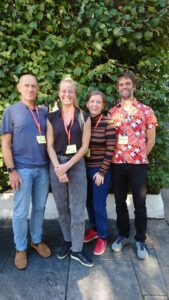Hi BIO,
This time I would like to highlight our researchers who are in the early stages of their careers, namely PhD students and postdoctoral fellows. During their years at BIO, they face many challenges and expectations that not only include generating and analyzing data but also publishing articles, navigating scientific landscapes, and preparing for the next step in their careers. Within these challenges lie great opportunities to grow, innovate, and establish a foundation for lasting involvement and impact in science.
The early stages of a scientific career are not only about research achievements but also about developing generative skills that extend beyond the field itself. Writing, for example, is a crucial creative skill that can shape how research is perceived and shared. Whether it’s crafting a compelling grant proposal or writing a clear and impactful manuscript, these are important abilities to develop. Similarly, the ability to teach, give academic presentations, and mentor others will be key skills to hone.
Fortunately, you don’t have to tackle these tasks alone, and an important part of career development is networking. Networking is about building relationships that can provide support, guidance, and inspiration throughout your career. Connections within and outside your field can also open doors to collaborations, insights, and opportunities that may not be immediately visible. At BIO, we recently saw a great initiative presented at the general meeting last Friday – the “Early Career Community (ECC).” ECC could become an important platform for younger researchers at BIO, both academically and socially. As an institute, BIO is committed and keen to support the development of efforts to assist people at the start of their careers. Activities such as career workshops, writing assistance, organizing conferences/workshops, and seminars have been discussed, and it will be exciting to follow this development going forward!
 As I write this, an exciting and fitting piece of news just came in: Gabriella Ljungström, postdoc at BIO, has had her project funding application approved by NRC for the project “Unlocking the Nutritional and Environmental Potential of Small Pelagic Fish: A Path Towards Sustainable Food Systems” (see details elsewhere in this week’s Bionytt). Congratulations!!!
As I write this, an exciting and fitting piece of news just came in: Gabriella Ljungström, postdoc at BIO, has had her project funding application approved by NRC for the project “Unlocking the Nutritional and Environmental Potential of Small Pelagic Fish: A Path Towards Sustainable Food Systems” (see details elsewhere in this week’s Bionytt). Congratulations!!!
Lastly, I just want to remind you of the general meeting this Monday, September 23rd, from 10:15 – 11:15. Dean Gunn Mangerud will give us a presentation on the current state of the Faculty of Mathematics and Natural Sciences. Welcome to the Large Auditorium, 2nd floor, Data Block, HiB.
Have a nice weekend!
Ståle
Project leader Gabriella, flanked by project collaborators Dag Aksnes, Katja Enberg, and Christian Jørgensen. Other project partners (not present today) are Marian Kjellevold (IMR), Emmanuelle Reboul (Aix-Marseille University, France), Helle Margrete Meltzer (Former research and Department director at the Norwegian Institute of Public Health). Non-academic partners: Pelagia AS, Orkla Foods Norge, Lysverket AS.

